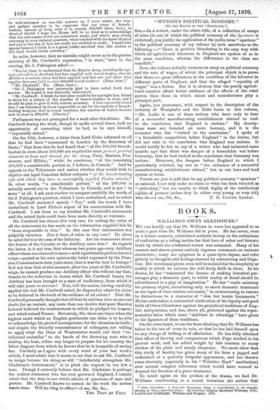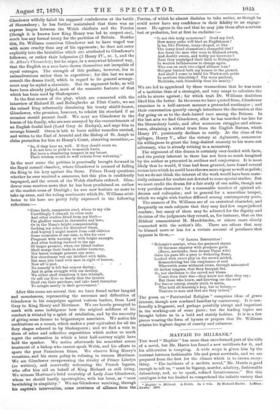BOOKS.
WILLIAMS'S OWEN GLENDOVVER.*
WE can hardly say that Dr. Williams in verse has appeared to us more a poet than Dr. Williams did in prose. He has never, even in a leisure moment, substituted xsthetic luxury or the enthusiasm of realization as a ruling motive for that love of sober and historic truth by which his celebrated review was animated. Many of his sonnets and stanza-poems embody vigorous comments on eminent characters ; many are epigrams in a quasi-lyric rhyme, and refer plainly to thoughts and feelings aroused by controversy and litiga- tion. His devotional pieces even will be noticed for the simplicity or nudity to which he reduces the still lively faith in them. In his drama, he has "renounced the licence of making historical per- sonages play a dramatic part, in which reality of detail should be subordinated to a play of imagination." He has "made accuracy his primary object, introducing only so much dramatic treatment as the lapse of time renders necessary," in endeavouring to restore to distinctness to a character of "dim 'but heroic lineaments." He has undertaken a substantial vindication of th-e loyalty and good faith of Owen Glendower against the prejudiced traditions of Eng- lish antiquarians, and has, above all, protested against the repre- sentative value which some "dabblers in ethnology " have given to the figments of these traditions.
On the other hand, we are far from thinking that Dr. Williams has taken to the use of verse in vain, or that he has laid himself open to any charge of trifling or of affectation. He has fully obtained that effect of brevity and compactness which Pope studied in his gravest work, and has added weight by this resource to many strokes of his plain and manly eloquence. We must allow that this study of brevity has given many of his lines a jagged and unfinished or a quaintly irregular appearance, and has thrown some obscurity (especially in his "Wiltshire Road" meditation) over several complex references which would have seemed to demand the freedom of a prose treatment.
To touch again on the preface of the drama, we find Dr. Williams condemning as a recent invention the notion that
* Owen' Glendower: a Dramatic Biography, being a Contribution to the Genuine History of Wales, and other Poems. By Goronva Catalan (Howland Williams, D.D.) London and Edinburgh : Williams and Norgate. 1870. Glendower wilfully failed his supposed confederates at the battle of Shrewsbury ; he has further maintained that there was no express league between the Welch chieftain and the Percies (though it is known how King Henry was led to suspect one), much less any formal treaty for the partition of Britain. Besides this, Dr. Williams conceives Glendower not to have waged war with more cruelty than any of his opponents ; be does not enter explicitly into the brutalities which are attributed to Glendower's followers, or rather their helpmates (2 Henry IV., sc. 1, and the St. Alban's Chronicles); but he urges, in a somewhat laboured way, that the English as a race have shown themselves not incapable of equal outrages. The strength of this preface, however, lies in animadversions rather than in exposition ; for this last we must consult the drama itself, which in regard to its general arrange- ment may be styled a chronicle. But its argument lacks, as will have been already judged, most of the romantic features of that which has been used by Shakespeare.
In the first scenes of the play, which are connected with the interview of Richard II. and Bolingbroke at Flint Castle, we see
the ruined king reluctantly dismissing his trusty shield-bearer, Glendower, who promises, however, to rehoist his standard if an occasion should present itself. We next see Glendower in the bosom of his family, who are sore annoyed by the encroachments of an English feudal lord (Lord Grey de Ruthyn), and urge him to revenge himself. Owen is loth to leave milder remedies untried, and writes to the Earl of Arundel and the Bishop of St. Asaph to claim protection for him at Henry's Court, observing meantime,—
" So, if they hear us, well. If they should scorn us,
I do not love to yield to womanish haste, But have a slumbering tempest in my breast Their wisdom would do well refrain from wakening."
In the next scene the petition is punctually brought forward in the Royal council chamber, where Glendower is accused of failing the King in his levy against the Scots. Prince Henry questions whether he ever received a summons, but this plea is confidently impugned, and the arrest of the Welsh chieftain ordered. Glen- dower soon receives news that he has been proclaimed an outlaw at the market-cross of Denbigh ; he can now hesitate no more to take up arms, and the ruling sentiments which Dr. Williams attri- butes to his hero are pretty fully expressed in the following reflections :—
" Come forth, companion steel, whom to my side Unwillingly I clasped, to other ends
And other studies fitted from my birth— Far gladlier versed in chronicles and laws, Or in the Muse's bright companionship Seeking my solace for distracted times, And hoping I might snatch from cold oblivion Some memories of our race, to live for ever Pregnant with warning or with bright example, And often looking forward to the age Of larger promise, when our island realms Shall merge their feuds in nobler harmony, Nor baron trample peasant any more, Nor churchman vex our intellect with fable, But man join hand with man in sight of heaven.
Now all is past No remedy is left but utmost daring; And in grim struggle with our destiny, We either shall transform it into triumph, Or sell our lives so dearly that the tyrants Shall rue their purchase, and take heed thereafter To mingle mercy in their government."
After this scene are several that we have found rather languid and monotonous, representing the successes and difficulties of Glendower in his campaigns against various leaders, from Lord Grey to King Henry and Mortimer. We are herein prompted to mark with some indulgence how the original mildness of his conduct is vitiated by a spirit of retaliation, and by the necessity of giving some licence to brigantesque associates. We notice his meditations on a comet, which makes a poor equivalent for all the fiery shapes referred to by Shakespeare ; and we find a vein in them of sober and reflective superstition which makes us much regret the estimation in which a later half-century might have held the speaker. We notice afterwards his somewhat severe treatment of a bishop who cannot speak Welsh, and his efforts to spare the poor Franciscan friars. We observe King Henry's vexations, and his stern policy in refusing to ransom Mortimer. We see Glendower overpowering the rivalry of Prince Lluelyn (so written), and reservedly welcoming the French legates, who offer him aid on behalf of King Richard as still living. We witness Mortimer's brief courtship of Lady Jane Glendower, whom we should hardly apostrophize, with her lover, as "most bewitching in simplicity." We see Glendower receiving, through his captive's intervention, some overtures of alliance from the Percies, of which he almost disdains to take notice, as though he could never have any confidence in their fidelity to an engage- ment. He agrees in the end that he may join them after a certain test or probation, but at first he exclaims :—
"Is not this truly monstrous ? Good my lord, How many oaths will bind an Englishman ? Is he, like Proteus, many-shaped, or like The many-hued chameleon's changeful tint? Are these the men who were to Richard sworn, And doubly sworn, and trebly yet forsworn ? Next they unpledged their faith to Bolingbroke In wanton faithlessness to change again. Who can on such two-edged alliance lean ? Hotspur burned both my houses to the ground, And shall I come to Mild his Warkworth pride In newborn friendship ? Far more perilous, Methinks, such friendship than his enmity."
We are led to apprehend by these transactions that he was more of a tactician than of a strategist, and very unapt to calculate the odds he strove against ; for which trait Dr. Williams doubtless liked him the better. In the scene we have quoted from, Glendower examines in a half-earnest manner a pretended soothsayer ; and their conversation queerly enough introduces the discussion at this day going on as to the dark-haired race among the Britons. In the last acts we find Glendower, after he has marched too late for the Shrewsbury battle, and after numerous struggles and adven- tures, obtaining a virtual truce from the English Barons, which Henry IV. persistently declines to ratify. At the close of the epilogue, Henry V., after the victory at Agincourt, announces his willingness to grant the long-desired amnesty to his worn-out adversary, who is already retiring to a monastery.
The argument of this drama is certainly over-loaded with facts, and the poetry inherent in these has not been so much imagined by the author as presented in outlines and conjectures. It is most likely that be would, if time had been granted, have found several scenes intowhich he could have thrown more vigour as well as polish; but we do not think the interest of the work would have been mate- rially enhanced for readers not devoted to some special studies. But we must credit the drama for a fair study of one noble, though not very peculiar character ; for a reasonable number of spirited ad- dresses and colloquies ; and in general for a masculine temper, which we might wish further diffused among contemporary poets.
The sonnets of Dr. Williams are of an oratorical character, and frequently on such subjects that they may find few unprejudiced readers ; but many of them may be admired for the dignity and decision of the judgments they record, as, for instance, that on the Biblical commentator M. Mendelssohn, or others more closely connected with the author's life. There are others that may be blamed more or less for a certain amount of petulance that appears in them,—
" 0 SANCTA SIMPLICTTAS !
"Bohemia's martyr, when the perjured shame Of German emperor with pompous guile (Baser, methinks, than deeper Papal wile) Gave his pure life a prey to withering flame, Looked with sweet pity on the crowd misled, Remembering but the simpleness of soul Wherewith some withered crone, through miscontrol Of darker tongues, that fiery banquet fed.
So, nor obedience to the crowd nor blame Count thou their due—they know not what they say; But those who know, and knowing see the need For fiercer outcry, simple truth to maim,
Who hold all learning's key, but to betray,—
Traitors to man and God are they indeed."
The poem on "Patriarchal Religion" comprises ideas of grave interest, though now rendered familiar by controversy. It is con- fessedly a fragment, and perhaps painfully abrupt and impatient in the working-out of some parts ; but the leading topics are brought before us in a bold and stately fashion. It is in a few pieces wearing the form of hymns or prayers that Dr. Williams attains his highest degree of suavity and calmness.































 Previous page
Previous page